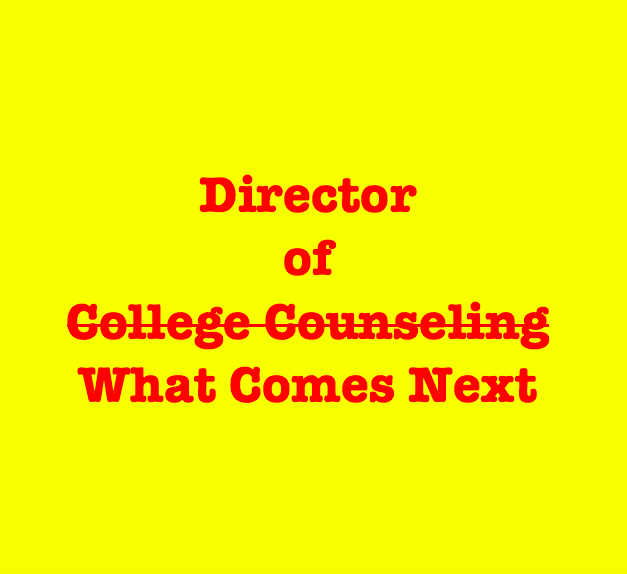 There is no doubt that something is very broken in American secondary and tertiary education. Over each of the last fourteen admissions cycles, I have helped students from around the corner and around the world navigate the college admissions process and tackle the full time of job of applying to American colleges and universities.
There is no doubt that something is very broken in American secondary and tertiary education. Over each of the last fourteen admissions cycles, I have helped students from around the corner and around the world navigate the college admissions process and tackle the full time of job of applying to American colleges and universities.
During this time, I have witnessed a dramatic increase in the number of students who are unaware of what makes them unique, what their goals are beyond getting into a ‘good college,’ and what actual options even exist for students graduating high school. What feels like an outbreak of complete lack of self-reflection and time dedicated to research and analysis is occurring at the same time as students are more programmed, stressed, miserable, and incapable of demonstrating what was once considered ‘college level’ verbal and written communication skills than I’ve ever witnessed before.
I can’t be a part of this madness anymore without speaking out. As I see it, three major changes need to be made in the way we educate children in this country, only one of which I have true control over as a person tasked with helping students transition from secondary education to what comes next.
- Starting in elementary school and continuing right through college, most students are not being taught the basics of writing, reading, and speaking English – whether these students attend public, private, or parochial schools. Students are taught to ape the style or priorities of their English teachers in order to earn an A instead of being taught how to think or communicate in an articulate, agile, and dynamic manner. I am not an English educator, but I can say after seeing thousands of essays produced by high school juniors and seniors and speaking to thousands of high school juniors and seniors that writing, reading, and speaking instruction is not being properly carried out in this country if we are to have any hope of sustaining – let alone building upon – the knowledge and attainment of previous generations.
- Students have little to no sense of who they are in relation to the generations of people who came before them and thus they have an increasing inability to put themselves in proper context; the result is that their college essays, whether well-written or not, read like narcissistic one-man plays, and from the admissions results I’ve seen up-close, colleges like it this way! We are doing a generation of our fellow citizens a great disservice when they can’t see beyond their own feelings and experiences, when they don’t know anything about their state’s history, and when they know appallingly little about their country’s history or the history of Western Civilization. Again, very few people in either secondary education or tertiary education seem too concerned about this, which brings me to what I can control…
- College is not the end all be all. In fact, for many students a four-year college experience can only lead to a lifetime sentence of debt and ignorance. Who appointed four-year colleges and universities to lord over us as non-negotiables of our human experience? All those who benefit from the higher education-government complex, that’s who. I’m done promoting this perverted ideology. Today, one can learn more valuable and applicable information on YouTube than one can learn by completing many four-year curricula on offer at America’s top-ranked colleges. Career, technical, and experiential education in all of their many forms – trade schools, apprenticeships, gap years, a paying job doing just about anything – are the best fit for many individuals who’ve just graduated high school. We are doing a disserve to students if we provide only college counseling. We are doing a disservice to students if we only provide college and career counseling. We must educate our students to pursue their own individuality and we must expose our students to the diverse options that exist after high school graduation – from the armed forces and community colleges to gap years and apprenticeship programs. I no longer have any desire to work in a school that trumpets its college admissions statistics, name drops the elite colleges and universities its students have matriculated into, or even slaps the name “College and Career” before the words “Counseling Office” or “Guidance Office.” In all of these scenarios, schools are giving colleges, universities, and employers far too much control of our youth. Students need to be empowered to think big and dream big. That requires not anchoring high school counseling, guidance, or advising to college or career at all.
At a time when long-standing traditions and institutions are actively attacked in our country on a daily basis – mainly from those who’ve been indoctrinated by or are employed by higher education institutions – I’m going to join all those in favor of tearing asunder the part of the past that I don’t like; don’t call me a “Director of College Counseling” or “College Counselor” anymore. It’s giving four-year colleges and universities, corporations, and governments – all of which are in business and are big business – way too much power over all of us. For as long as I continue to help students and families transition from high school to what comes next, from this point forward, if you are going to refer to me as a “Director” of anything, please refer to me as “Director of What Comes Next.” “What Comes Next Counselor” also has a nice ring to it. In return, I promise to provide you a “What Comes Next” guidance experience that exposes you to the full diversity of post-secondary options. Even if 100% of my students continue to enroll in four-year colleges and universities, if my recalibrated approach to post-secondary guidance gives even one student or family pause to consider the benefits of attending a community college while working a full-time job, or pursuing an apprenticeship, or taking a gap-year, or joining the military, or getting a job as a waiter, or earning a degree abroad, or starting a business I will have earned my title as “Director of What Comes Next” and I will feel so much better about myself knowing that I am no longer a cog in the wheel of the American higher education-government complex that has for far too long entranced far too many Americans.
 Yet, most of all, I will feel great for the young men and women I work with every day because once they see a four-year college or university is not the be all end all, maybe some of them will calm down, drop out of a few of their extracurricular activities, and use their spare time to pick up and read a book like Great Expectations or Candide or go on YouTube and watch for free the full thirteen installments of Civilisation: A Personal View by Kenneth Clark. There is no doubt that after doing so students will be closer to gaining a healthy perspective on life than they ever could playing America’s obscene college admissions game.
Yet, most of all, I will feel great for the young men and women I work with every day because once they see a four-year college or university is not the be all end all, maybe some of them will calm down, drop out of a few of their extracurricular activities, and use their spare time to pick up and read a book like Great Expectations or Candide or go on YouTube and watch for free the full thirteen installments of Civilisation: A Personal View by Kenneth Clark. There is no doubt that after doing so students will be closer to gaining a healthy perspective on life than they ever could playing America’s obscene college admissions game.
I may still be the CollegeMeister, but I will remind all with whom I work that where one goes to college (if they do at all) or where one works 40+ hours each week (if they do at all) does not define a person. If anything, the sobriquet CollegeMeister is more apt than ever because I have not just mastered the Byzantine art of getting into the world’s “top colleges;” I have freed my clients, my colleagues, and myself from colleges’ former power over all of us, and I look forward to helping others see the light. No longer will colleges be the masters and the rest of us their slaves.



